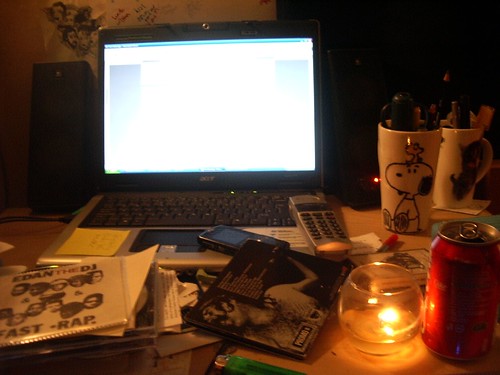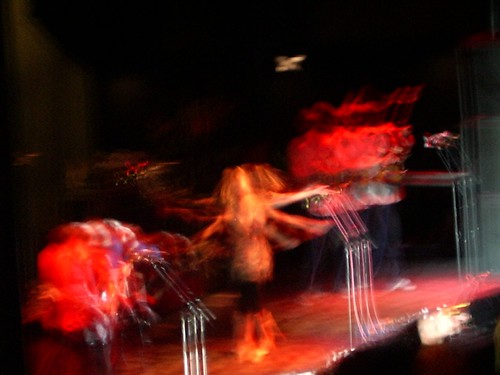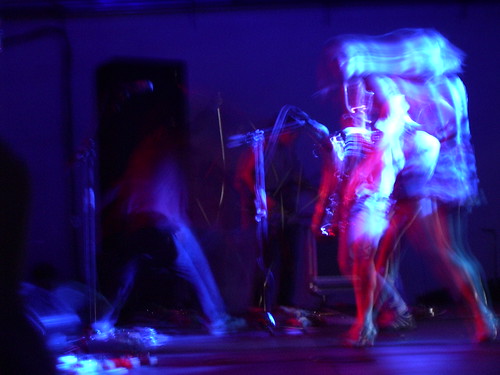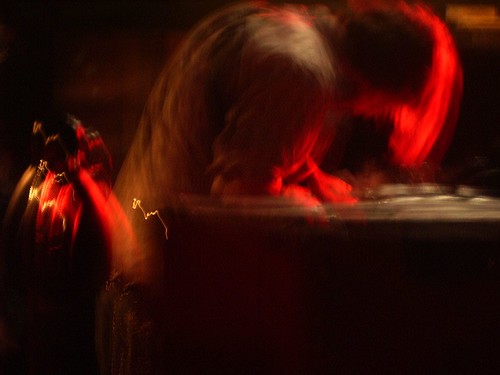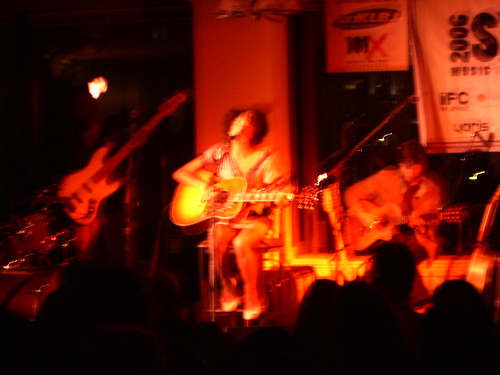“EEEEEEEEEEEEEEEEEEEEEEEEEEEEEEEEEEEE!”
The high-pitched banshee wail is ear-piercing and nigh unbearable. We’re at Nellis Air Force Base in Clark County Nevada, North East of Las Vegas, where the majority of the US Air Force log their hours of fighter pilot training, a location that has weathered the arcing screams and sonic booms of modern jet airplanes since opening in 1941.
But this isn’t the airstrip, rather an on-base department store for local military personnel and their families. And that incessant shriek isn’t the sound of burning jet fuel and whirring turbines, but hundreds of young kids, mostly girls, assembled for a meet’n’greet signing session with their idols, Chicagoan pop-punks Fall Out Boy, playing the Palms hotel in Las Vegas later that evening. As the group sit behind a long table piled high with promotional posters, idly toying with sharpie pens, armed Military Police dressed in camo-garb manage the crowd, barking at them to stand behind the grey plastic shopping trolleys banded together like some crude velvet rope. Beatlemania was never like this.
Or perhaps it was. The group’s tour manager Charlie, a towering, shaven-headed dude who looks like a squaddie himself, yells at the slowly-moving line that “Only one item per person will be signed”; the (mostly) girls file past, bringing with them CD sleeves and promo photos and even a couple of guitars to be signed by the group. More precious even than the autographs, however, is the fleeting personal contact with their heroes, and bassist and chief heart-throb Pete Wentz in particular.
“He told me that he liked my hair and my face!” screams one hyperventilating nine year old to her mother, signed poster clutched to heaving chest. “Oh! My! God! Pete said ‘What’s up?’ to me!!” yells another pre-teen hysteric, like the greeting could cure cooties. Only a dead-hearted cynic could remain unmoved by such unabashed devotion, however unsettling it might initially seem.
“They’re reacting in the way they’ve been programmed to,” Wentz explains later, indulgently and a little bashfully, of such Beatlemanic scenes. “They only know you through MTV and the photo in the CD booklet, so when they actually meet you it blows their mind. I ‘get’ it, because that enthusiasm is what allows you to keep making music.” Still, the meet-and-greets take their toll; Wentz’s right hand, currently decorated with a deep red scar as a result of an onstage mishap, has suffered enough from crushing fan handshakes that he now offers his left out of habit.
The 200th fan having collected her poster, the signing session is ended with appropriately military precision, Charlie shepherding his boys towards the exit, the MPs dispersing the crowd. As the Fall Out boys scurry past the blouses, skirts and bras of the ladieswear section, fans disobey the soldiers’ commands and run after them, one desperate mother materialising from behind a rail of petticoats to snap Pete on her camera-phone. “Smiiiile for my daughter!” she howls, as Charlie runs interference and the group disappear through the doorway, to a USAF van waiting with its engine running outside. Welcome to a ‘typical’ day in the life of Fall Out Boy.
“When things like that become totally ordinary in your life, it changes who you are as a person,” muses Wentz moments later, as the group speed along to the Palms Hotel, and the next of their promotional commitments. He’s typing endlessly on his Sidekick; tonight’s support act +44 (fronted by Mark Hoppus, formerly of multi-platinum pop-punks Blink 182) have had to pull out, and Wentz is trying to organise last-minute substitutes in the form of Panic! At The Disco, a
Sat behind him, Patrick Stump, Fall Out Boy’s singer/guitarist, pores over a package handed to him earlier by a fan, a folder containing a gift for each member of the band. “Look, she did a painting each for all the other guys,” Stump frowns, indicating three surreal watercolours enclosed, “and they’re real good. And I got a sheet containing parody lyrics for one of our songs.”
Patrick lifts up his ever-present baseball cap and ruffles the mop of butterscotch hair hidden beneath. While he sings all the group’s songs, and indeed writes all the music, it’s Wentz, the bassist and lyricist of the group, who’s considered the ‘frontman’. Where Wentz is kohl-eyed and olive-skinned, with an easy and infectious grin that doubtless glows in the dreams of his many fans, Stump is, by his own self-deprecating admission, not exactly a heart-throb. “I’m a totally normal guy,” he smiles. “I’m what we call ‘TV Ugly’, where I’m handsome enough to be cast as the ugly friend. I’m ‘TV Fat’, a ‘thin’ guy compared to most of the population, but, well, you know...”
Stump doesn’t envy the attention Wentz ‘enjoys’ from the media, focussed as it is on his puppy-dog looks, his relationship with pop singer Ashlee Simpson, and the more turbulent corners of his private life. “It’s strange, the person they sometimes make Pete out to be,” puzzles Stump. “I know him as good as anyone’s gonna know him; the guy I’ve read about is a dick, but he has nothing to do with Pete Wentz.”
Certainly, Wentz has endured a rocky ride through stardom, ever since the group’s major label debut, 2005’s From Under The Cork Tree, made them an ‘overnight success’ on their third album. The group formed in
Signed to Island records for From Under The Cork Tree, the album’s lead-off single ‘Sugar We’re Goin’ Down’ – a confection of anthemic punk-rock riffage, sugary harmonies and the kind of perfect-pop hook that imbeds itself in your brain without mercy – was soon an MTV smash, ensuring the album sold 68,000 copies in its first week (eventually going double-platinum) and delivering the group to the ever-rabid audience of hit show Total Request Live, typically stomping grounds for unabashed pop acts like Britney and Justin. It was a weird environment for a punk-rock band from
“I don’t think any of us anticipated any of this when we formed,” deadpans Stump, of the promotional activities their fast-won celebrity demands. “I was brought up on punk rock. I’d go to shows, and when a band starts playing people rock out, and when the band stops they go and have conversations, and the band walks offstage unhassled. You love the bands, but you could give two shits about the guys who play in them. And so, the first time someone said ‘hey, will you sign this album?’, I said ‘but I’ll get marker pen on it and ruin it!’”
It was Wentz who was to feel the public gaze most keenly, especially when naked photos of the bassist, shot on his Sidekick and sent to a possible romantic conquest, leaked onto the internet in March 2006. “I’ve been so candid in the past, and its burned me,” Wentz blushes. “I used to speak without a filter, but I ended up in hot water.”
This troublesome honesty wasn’t just limited to Wentz’s sex-life; he was also candidly open about struggles with his emotional health and his experiences with anti-depressants, a rollercoaster that ran at perilous speed throughout the making of From Under The Cork Tree.
“I can barely remember those years,” he grimaces, settling himself on the sofa of his tourbus, rough-housing with touring companion, gorgeous one year old bulldog Hemingway. “I was taking prescription medication; I was definitely a Drugstore Cowboy, mixing this with this, seeing what the combinations did. I couldn’t picture myself in two years. People would ask, what are you going to do on the next record? And I’d say dude, I can’t even see myself being alive.”
It’s a common story for kids of Wentz’s generation, prescribed anti-depressants at an early age, upon which they soon become reliant;
A near-fatal overdose on sedative Ativan early in 2005 inspired From Under The Cork Tree’s key song, ‘7 Minutes In Heaven (Atavan Halen)’, though Wentz says today, “I’ve never described anything that happened to me as a ‘suicide attempt’. But I thank God for my bandmates every day, for their tolerance. I was completely self-aware of the situation I was in, but I didn’t care enough to do anything. The guy who doesn’t know what he was doing, you can’t blame him, he doesn’t know. But the guy who knows it, and is just sitting there putting himself through it, you’d hate that guy. And that’s who I felt I was. In
Wentz’s emotional turbulence provides much meat for his songwriting, penning lyrics that balance a scarringly confessional bent with a penchant for wordplay; sample song titles include ‘Don’t You Know Who I Think I Am’, ‘Champagne For My Real Friends, Real Pain For My Sham Friends’, and ‘I’ve Got All This Ringing In My Ears But None On My Fingers’. Like all the best pop, Fall Out Boy play adolescent conflicts out as high drama, Wentz’s lyrics allied to riffs and melodies surging with an emotive dynamism, penned and sung by Stump. “It’s like he’s writing confession, and I’m singing it,” laughs Patrick. “I’m like a priest to him that way. He gets to say it through me, and I get to absolve him.”
The lyrics speak to a generation similarly anxious and disturbed, finding succour in songs awash with anguish; but Pete says he doesn’t have answers. “People come up to me and say, ‘Your band saved my life’… I still haven’t figured out how to react to that. Because, yeah, this band saved my life too. Honestly, I feel like one of the last people who should be giving advice to anyone about anything. I’m not the Doctor Phil of punk music.”
Patrick Stump reckons he was about eight or nine years old when music began to take over his life. “My parents had divorced, and I was helping my dad move his stuff out,” Stump remembers. “I was confronted by this vast record collection. I was a little guy, I couldn’t manage a whole box of vinyl, so carried them record by record, asking my dad about all these albums as I went along.” Stump’s father was a singer/guitarist in a local group through the 1960s and 70s, with a record collection swollen with rock, blues and jazz. “He had Herbie Hancock records, and Eddie Harris records, and he really loved Van Morrison. It was the blues and jazz stuff that really got me into music. Then I became a Prince nerd, and really got into David Bowie. Now, I’d say hip-hop is probably the music we as a band all love the most. I know that’s a strange thing for a dude in a rock group to say.”
Sat on the corner of the double bed that swamps his room at the back of the other Fall Out Boy tourbus – an array of baseball caps hanging on pegs from the wall, his dapper onstage trilby perched upon a hat stand by the bedside – Stump explains that the group’s latest album, this year’s Infinity On High, was written “with a chip on my shoulder. People told us that we were making music for fourteen year olds, and I took it as a compliment; when you’re fourteen, you’re not tainted yet. I’ve been one of those totally arrogant, idiot rock snobs in my time, but if you’re an artist it makes for bad art.
“I woke up one morning in a
For the album, these fledgling pop celebrities collaborated with both Jay Z and R&B legend Babyface. “It was great working with Babyface,” smiles Stump. “He almost doesn’t have to do anything to make you play better, you just walk into his studio, and the weight of all the classic music he’s recorded makes you raise your game somehow.” The album’s lead-off single, ‘This Ain’t A Scene, It’s An Arms Race’, charted at #2 in the UK, a near-perfect synthesis of R’n’B squelch and punk-rock furore indicative of the ambitious, unabashedly pop-friendly embrace of Infinity On High.
A knock at Stump’s door signals the next in the day’s packed series of events, playing blackjack in the casino of the Palms hotel with contest winners from a local radio competition. With fans milling about the hotel hoping for a glimpse of their heroes, Charlie and his security detail ferry the group into the casino like a crack commando unit. But as the group take their places at the card tables and meet the competition winners, few in the casino seem to care, too enthralled by the endlessly blinking and chirping slot machines swallowing their cash at fearsome pace. Welcome to Vegas, baby. The gambling session is followed by another meet’n’greet in a ballroom on the other side of the hotel, the security guards marching the band over so they can have their photos taken with fan-club members who bring ‘FOB’-decorated cup-cakes and plush animal toys for their heroes.
Minutes later, the group are onstage, dashing through their anthems of adolescent heartache with joyous energy, Wentz and Trohman leaping off an onstage ramp and throwing rock shapes as the audience responds with that same Beatlemanic roar from earlier. An impressive cover of Michael Jackson’s ‘Beat It’ is momentarily curtailed while Wentz cools off a fight brewing in the crowd. Panic At The Disco’s two frontmen take the stage for a surprise acoustic set before Fall Out Boy’s encore, which closes with an explosion of pyrotechnics and glitter, and more of those teenage screams. (Wentz points out earlier that the Vegas show is at a much smaller venue than the rest of the tour, precluding such onstage FX as the props which malfunctioned earlier in the tour, leaving Patrick Stump trapped inside, much like Spinal Tap bassist Derek Smalls.)
Moments after he’s run offstage, Wentz takes time out from an impromptu aftershow party brewing backstage with his friends from the other groups touring with Fall Out Boy during the summer, returning to his bus to talk some more, about a future he once couldn’t see, and his rejection of depression and self-medication as a way of life.
“This had become a business of misery by accident,” he smiles. “The whole idea of the new album was to have a smile on your face, that you shouldn’t feel guilty about being happy. I love the adventure of being in Fall Out Boy. Sometimes I think about homeless guys, and about how I could easily find myself in the gutter someday – that’s just the kind of personality I have – but it would still be an adventure. I’ll be talking to Hobo Jim on the boxcar, saying ‘Yeah, I was in Fall Out Boy, I hung out with Jay Z!’ And he’ll be like, ‘yeah right, the guy in rags hung with Jay Z, sure man’.”
For all his fantasies of unexpected hobo-dom, Wentz is unlikely to find himself homeless in the near future, and seems to have made some kind of peace with these newfound responsibilities of fame. “I’ve got a weird brain chemistry, he admits. “Honestly, I used to wake up and wanna blow my head off. I don’t feel like that anymore. For so long, my life was like the crocodile with the clock in his stomach chasing Captain Hook; the clock always ticking and the jaws always snapping. There was a good six months where I was just toxic, over-medicated. I’m relying on that less, relying on my friends more. I think last year was the most dangerous year for Fall Out Boy, and the most dangerous year for myself, because its so easy to believe the people whispering in your ear, to get caught up in it all. I thank God I got through it, and came out of the other side.
“I picture myself having a family now,” he smiles. “Before, my dreams were about being in the biggest band in the world, playing shows all over the globe to thousands of people. Now, my dreams are of back yards and hanging out. It’s a good progression for me, trying to figure out what’s normal…”
Hemingway, gnawing at a juicy marrowbone on the floor, jumps up into his master’s lap at a click of Wentz’s fingers, Pete tugging lovingly at his ears, so the dog playfully bares his fangs. “Anyway, I’ve got Hemingway now,” he laughs. “I can’t just sleep in past noon anymore, otherwise he won’t get fed.”
(c) 2007 Stevie Chick